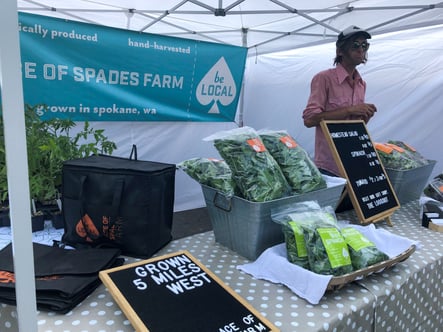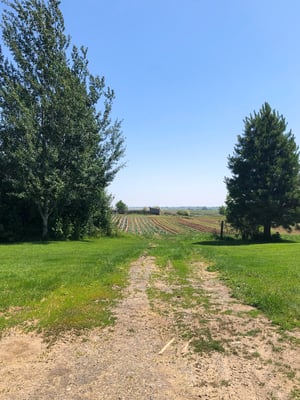
Here in the Northwest, the farm season is fully underway with spring cool crops of radishes and spinach giving way to the summertime bounty. Our sales representatives are spending time visiting farmers in the area and across the country to be as up to date as possible with new varieties and issues facing farmers on a day-to-day basis.
Recently, I traveled to the eastern side of Washington State to visit farmers in the Spokane area as well as a farm in the dryer, arid parts of central Washington. As the second largest city in Washington, Spokane has a vibrant urban farm scene with restaurants and farmer’s markets to support it. There is a plethora of market garden farms in and around Spokane, with new ones starting every year. These small-scale, diversified, organically-minded farms have banded together to form a cooperative to sell their products called LINC Foods that brings together farms from Spokane and beyond.
 The climate in the Spokane area has its challenges with a relatively short growing season—generally about four months from mid-May to the end of September. The frost danger can linger late into the spring with surprise frosts hitting some areas as late as June. Timing and careful consideration are essential in this area. Each farm I visited had a different approach to their farm with a varied focus for crop selection. I was happy to visit with Ace of Spades Farm, Thompson Creek Farm, Urban Eden Farm, and New Heritage Market Garden.
The climate in the Spokane area has its challenges with a relatively short growing season—generally about four months from mid-May to the end of September. The frost danger can linger late into the spring with surprise frosts hitting some areas as late as June. Timing and careful consideration are essential in this area. Each farm I visited had a different approach to their farm with a varied focus for crop selection. I was happy to visit with Ace of Spades Farm, Thompson Creek Farm, Urban Eden Farm, and New Heritage Market Garden.
On my way back across the mountains to the western side of Washington, I stopped by Big Sage Organics near Othello in a dry part of central Washington. This region is characterized by its desert climate and high summer temperatures, as well as the annual fire season that occurs throughout late spring and fall. The season starts earlier in this region than in Spokane. Farmers can typically get into the ground in February, which helps get a jump start on cool-season crops before it gets too hot later in the spring. Typically, the crops grown are grains and stone fruits, but there are more diversified vegetable farms up for the challenge of this region. Big Sage Organics is a 9-acre vegetable farm that grows a wide range of crops, from brassicas in the shoulder season to melons and tomatoes in the heat of the summer.
We always learn so much from visiting our customers, especially about microclimates and the challenges of growing mixed vegetables. Being on the ground helps us provide the best seeds we can, while always improving our catalog selection!